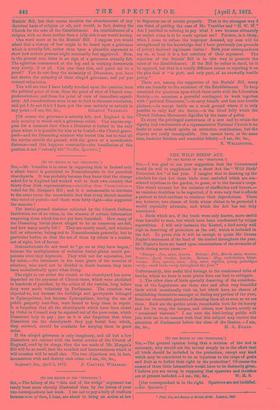[TO TER EDITOR OF THE " SPECTATOR:]
Sra,—The fallacy of the "thin end of the wedge" argument has rarely been more cleverly illustrated than by the letters of your two correspondents last week. I am not to pay a body of creditors because some of them, I hear, are about to bring an action at law to dispossess me of certain property. That is the strongest way I can think of petting the case of Mr. Venables and "H. W. W." Am I justified in refusing to pay what I owe because ultimately an unjust claim is to be made against me? Further, is it likely, when I come to refuse the improper demand, my case will be- strengthened by the knowledge that I have previously (on grounds of policy) declined legitimate claims ? Both your correspondents.
say so, at least it is a fair corollary of their argument. The- rejection of the Burials' Bill is in this way to promote the cause of the Establishment. If the Bill be unfair in itself, let it be opposed, but that is a totally different course to rejecting it on the plea that it "is part, and only part, of an avowedly hostile policy."
There are, among the supporters of the Burials' Bill, many who are friendly to the existence of the Establishment. To keep unsettled the questions upon which these unite with the Liberation Society,—to accustom a powerful contingent to work together- with "political Dissenters,"—to Berry friends and foes into hostile phalanx,—to accept battle on a weak ground where it is only possible to rally half the forces,—is the blind folly which the- Church Defence Movement dignifies by the name of policy.
To enjoy the privileged narrowness of a sect and to retain the- dignity and emoluments of a representative National Church is no doubt to some ardent spirits an attractive combination, but the- objects are really incompatible. One cannot have, at the earns time, bachelor freedom and connubial felicity.—I am, Sir, &c., S. WELLINGTON.


































 Previous page
Previous page